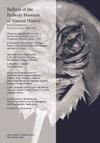黑色假贻贝,mytillopsis leucophaeata(双壳目:贻贝科),在康涅狄格州纽黑文县纽黑文西下游河
IF 0.9
4区 哲学
Q2 BIODIVERSITY CONSERVATION
引用次数: 7
摘要
2015年10月,在美国康涅狄格州纽黑文县纽黑文Edgewood公园西河鸭池中发现了深色假贻贝mytillopsis leucophaeata。白带丝虫病的自然特有范围是墨西哥湾和北美温带大西洋沿岸,从墨西哥的坦皮科向北到切萨皮克湾。20世纪30年代末,在纽约哈德逊河流域,白食mytillopsis leucophaeata开始出现。此前仅有的关于新英格兰白食mytillopsis的报道是1981年在马萨诸塞州波士顿附近的查尔斯河和20世纪90年代在康涅狄格州费尔菲尔德县的胡萨托尼克河。白食Mytilopsis leucophaeata已被描述为相当于斑马贻贝(Dreissena polymorpha)的半咸水生物,并与欧洲引进的水冷系统的严重污染问题有关。据推测,在2012年完成的潮汐沼泽和河道修复工程中,由于纽黑文港船舶的压载水引入了白蚁Mytilopsis leucophaeata,并在西河下游安装了双向潮汐门。其他收集到的无脊椎动物有水螅虫Cordylophora caspia;佛罗里达多毛纲和毛多毛纲;片脚类:片尾鱼和明镜拟鱼;象牙藤壶(Amphibalanus eburneus);还有萨伊的泥蟹,叫做沙伊。蓝蟹(Callinectes sapidus)常见。鸭池中曾经大量存在的淡水水蛭Helobdella modesta没有被收集。考虑到白食mytillopsis的侵袭性,再加上对其自然史的许多方面的知识缺乏,特别是在引入环境中,对该种群进行监测是很重要的。本文章由计算机程序翻译,如有差异,请以英文原文为准。
Dark False Mussel, Mytilopsis leucophaeata (Bivalvia: Dreissenidae), in the Lower West River, New Haven, New Haven County, Connecticut
Abstract In October 2015, the dark false mussel, Mytilopsis leucophaeata, was encountered in the Duck Pond of the West River at Edgewood Park in New Haven, New Haven County, Connecticut, USA. The natural endemic range of Mytilopsis leucophaeata is the Gulf of Mexico and the temperate Atlantic coast of North America from Tampico, Mexico, northward to the Chesapeake Bay. In the late 1930s, Mytilopsis leucophaeata became established in the Hudson River basin in New York. The only previous reports of Mytilopsis leucophaeata from New England are from the Charles River near Boston, Massachusetts, in 1981 and from the Housatonic River in Fairfield County, Connecticut, in the 1990s. Mytilopsis leucophaeata has been characterized as the brackish-water equivalent to the zebra mussel, Dreissena polymorpha, and has been associated with severe fouling problems of water-cooling systems in Europe where it has been introduced. It is hypothesized that Mytilopsis leucophaeata was introduced by ballast water of ships from New Haven Harbor and established in the lower West River subsequent to the installation of two-way tidal gates in the course of a tidal marsh and channel restoration project completed in 2012. Other invertebrates collected were the hydrozoan Cordylophora caspia; the polychaetes Hobsonia florida and Polydora cf. ciliata; the amphipods Gammarus fasciatus and Apocorophium simile; the ivory barnacle, Amphibalanus eburneus; and Say's mud crab, Dyspanopeus sayi. The blue crab, Callinectes sapidus, was commonly observed. The freshwater leech, Helobdella modesta, which was once abundant in the Duck Pond, was not collected. Given the invasive potential of Mytilopsis leucophaeata, in conjunction with the paucity of knowledge of many aspects of its natural history, especially in introduced settings, it is important to monitor this population.
求助全文
通过发布文献求助,成功后即可免费获取论文全文。
去求助
来源期刊

Bulletin of the Peabody Museum of Natural History
BIODIVERSITY CONSERVATION-ECOLOGY
CiteScore
2.40
自引率
0.00%
发文量
6
审稿时长
>12 weeks
期刊介绍:
The Bulletin of the Peabody Museum of Natural History publishes original research based on specimens, artifacts and related materials maintained in the collections of the Yale Peabody Museum of Natural History’s curatorial divisions. The Bulletin is published twice a year, in April and October.
 求助内容:
求助内容: 应助结果提醒方式:
应助结果提醒方式:


